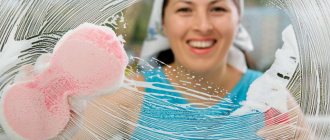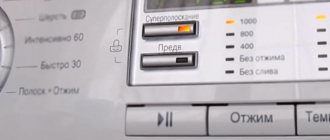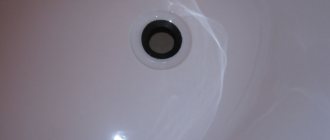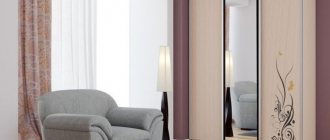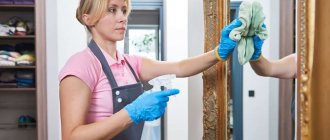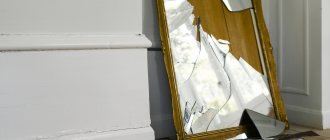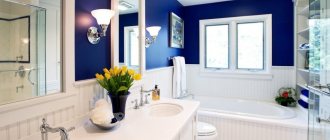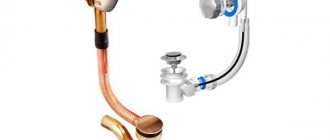A tricky way to help remove fogging from your bathroom mirror.
Everyone has encountered the problem of foggy mirrors in the bathroom after finishing their water treatments. The steam that settles on the surface collects in the form of drops and begins to flow down, and because of this it becomes very difficult to see your reflection. What can I do to prevent the mirror from fogging up? Bathroom mirror fogging is the most common problem that can be solved using various methods. For example, the most effective would be to install a shower stall, or you can equip an additional ventilation system.
Causes of fogging
If you take a cold or lukewarm shower, the mirror will not sweat. The problem plagues lovers of high temperatures due to the abundant evaporation of water.
A cold surface is a magnet for condensation. The steam settles on it, the air in the enclosed space of the bathroom quickly heats up, contributing to an increase in evaporation.
Why does the bathroom mirror fog up when bathing?
The main reason is the temperature difference between the air, which is saturated with water vapor, and the mirror surface. Since the mirror heats up more slowly, it remains cold longer. Closer to the surface of the glass, the air begins to cool, and when it reaches the so-called “dew point,” the drops begin to settle.
A foggy mirror is very difficult to use for its intended purpose. This causes a lot of inconvenience.
There are many ways you can relieve discomfort for a while.
Effective technical means of combating fogging
Modern technologies offer advanced methods against condensation on mirror surfaces. Available for purchase:
- Mirror with anti-fogging effect - sold in construction and furniture stores.
- Electric blower - it will pump air currents, directing them to the glass, accelerating the elimination of steam.
- Sealed shower curtains - the bathroom space will be protected from fumes.
- An ordinary hairdryer - ten seconds of drying is enough to completely remove condensation.
What to do to prevent the surface from fogging up?
Fogging of bathroom mirrors is a common phenomenon that can be easily solved in many ways. For example, you can install a shower stall or an additional ventilation system, or you can simply use easy folk methods.
The need for ventilation in the room for water procedures
Ventilation in the bathroom allows you not only to extract heated air, but also to lower its temperature and humidity, which accordingly reduces the formation of condensation and steam in the room.
It happens that “original” hoods do not fully cope with the task; to increase ventilation, you can install an additional fan in the hood, which is connected to the mains . This fan is convenient because you can turn it on when necessary.
In addition to increasing general ventilation, you can solve the problem with condensation in another way - install a system for blowing the mirror, or, more simply, a small fan directly next to it.
Shower cabin and steam isolation
Installing a shower cabin not only saves space in the bathroom, but also solves the problem of condensation. Shower doors prevent water from splashing and steam from spreading throughout the room.
Effective prevention - heating the mirror surface
The essence of the method is to regulate the temperature of the mirror surface - equal or similar temperatures of the surrounding air and the mirror prevent steam condensation.
To prevent the mirror surface from sweating, a special device was invented to heat it - an anti-fog device. It is a wire about 0.5 m long, with special heating threads; The device is attached to the back surface of the mirror, after which it is connected to the network. Such an anti-fog device consumes very little electricity.
Effective folk remedies to prevent fogging
Folk remedies will help you avoid trouble on a budget. To prevent your mirror from sweating, try products that are always on hand.
Method number 1: rubbing glass with shampoo
Before water procedures, you need to apply a small amount of shampoo to the mirror and distribute it over the entire surface with a regular napkin. The glass must be dry and clean. The effect after the procedure lasts up to three weeks.
Method No. 2: laundry soap
You need to rub clean, dry glass with a piece of laundry soap. The effect lasts up to a week.
Method number 3: shaving cream
The method is similar to rubbing with shampoo, the only difference is that the product is replaced with shaving cream/foam. Apply a little cream to the reflective surface and spread evenly with a napkin. The effect lasts up to two to three weeks.
Method number 4: vinegar
Prepare a vinegar solution: for 0.1 liters of water you will need 1 tablespoon of vinegar (9%). You can add a few drops of lemon juice to eliminate the unpleasant odor of the product. Wipe the mirror with a napkin soaked in the solution, leaving it slightly damp.
After the product dries, the effect lasts up to two weeks. It is important not to replace vinegar with essence!
Method number 5: gelatin
Dissolve 2 teaspoons of gelatin in 0.1 liters of warm water. Allow the gelatin to swell and spread the product with a napkin. Gelatin prevents fogging for about a week.
Method number 6: glycerin
Dampen a microfiber cloth with glycerin and wipe the mirror. Condensation will not collect for a little over a week.
Glycerin is available in pharmacies without a prescription.
Method No. 7: anti-fog agent for car windows
You need to apply the product to the reflective surface, spread it with a special rag or a regular napkin - just like when treating car glass. The product works for 1 week, after which the procedure must be repeated.
“Splash” - and you’re done!
How to remove stains?
A bathroom mirror requires more careful and frequent maintenance than other glass or mirror surfaces in the house. You can remove remnants of cosmetics, toothpaste, grease stains and other contaminants without leaving streaks using both store-bought household chemicals and folk methods.
When buying a detergent, you need to pay attention to the composition - it must contain alcohol (just not ammonia). Such products effectively cope with any stains without leaving streaks.
For lovers of folk remedies there are several simple ways:
- Cut the raw potatoes in half and treat the mirror; after 5 minutes, rinse the mirror well with cold water, then wipe dry with a paper towel. Also, potatoes can be replaced with onions.
- Mix vinegar and water in equal parts, treat the mirror, then wipe dry with a napkin.
- In addition, the mirror can be wiped with regular cologne or vodka, and then polish the surface of the mirror with paper or a napkin.
Proper regular care of the mirror surface, periodic ventilation and other described methods will help to permanently solve the problem of fogging and keep the mirror looking beautiful and clean.
Heating system: DIY anti-fog bathroom mirror
The method is suitable for anyone who likes to make useful things on their own. You can buy a ready-made heated mirror, but it’s much more interesting to make it yourself.
How the anti-fog mirror works
Condensation settles on objects with a temperature below the ambient temperature. Heating the surface of the mirror will make its temperature much higher, and irritating drops will not settle on the glass.
DIY: mirror heating system
There are 2 methods for heating. The first is good for renovating an unfinished bathroom, the second is suitable for beginners in construction.
- Heated floor mats are purchased at a hardware store and mounted into the wall. There are special mats for heating mirrors; floor mats can also be used. You need to apply special tile adhesive to the wall, “drown” the mat in it, cover it with tiles on top and hang a mirror. This method will cost approximately 5,000 rubles.
- Heating film is a simple, affordable way. The device consists of graphite and polyethylene, operates from a power outlet, and heats the glass in 15 minutes. You need to glue it to the back of the object with tape or glue. You can “connect” the heating system to a switch so that the device starts working when the light in the bathroom is turned on. The approximate cost of such a solution is 3,000 rubles.
Is it necessary to ventilate?
Even if the hood is working properly, the bathroom must be ventilated periodically, because the level of humidity in it is always very high.
Ventilation will help not only get rid of steam build-up, but also other common bathroom problems:
- mustiness, unpleasant odors;
- the occurrence of fungus and mold;
- rust formation on metal elements;
- destruction of finishing elements - cracking, darkening, chipping of grout or tiles.
It is enough to simply leave the door to the room open for a couple of hours.
Technical devices
Heated mirror
The easiest way to solve the problem: drying with a towel. This procedure must be performed after taking a bath. But much more effective are technical devices that will help you forget about condensation forever:
- Electric blower is a special device that forces a flow of air, causing water droplets to quickly evaporate.
- Heating is another “lotion” that will prevent the mirror from fogging up. The surface heats up, which means there are no conditions for condensation to occur.
- A hair dryer acts in a complex manner, like the two devices listed above: it heats and dries the foggy surface with a stream of air. It is enough to warm up the mirror with an air stream for a few seconds so that no trace of condensation remains.
- Purchasing a shower cabin with sealed curtains. If you take water procedures in the shower, the hot steam will not penetrate outside the cabin and the mirror will remain clean and dry.
The advantage of the technical method is that you can always maintain the mirror without condensation, while folk remedies can only help in solving the problem, but not in preventing it. But keep in mind that most devices will cost much more than available materials.
Radical solutions
Illuminated + heated mirror
You can solve the problem in one fell swoop. Take advantage of the generation of modern technologies. Buy a mirror with a light so that it does not fog up.
But everything is very simple. Hot air in contact with cold glass does not turn into water. And the layer of moisture that irritates you stops bothering you. How does this work? The developers came up with a solution to the problem. Infrared emitters are installed on the back of the mirrors for heating. There is no need to check the heat level to prevent fogging. The proportions of temperature and humidity in the room do not play a role in this case.
Thrifty owners choose backlit options. When you pass your hand under the mirror, the light and heating turn on. They consume as much energy as a simple light bulb. This piece of furniture will be useful for the whole family. For men to shave. There is no need to be distracted by periodic wiping. Women put on masks, put on makeup, and do their hair. And for this, the lighting must be bright and regular. So that, once you get used to it, you take into account how bright the makeup can be in daylight. In winter, you can’t put on makeup near the window.
Constant moisture causes metal parts to deteriorate over time, of course. They might even rust. But there are ways to restore the coverage. They are described in the relevant articles. There is nothing complicated about them. And they're inexpensive. In addition, several years must pass before the problem becomes a concern. We eliminate it and continue to enjoy the development of technologists-designers.
If at the moment there are no extra funds to purchase this wonderful new product, then for now you can use folk remedies. They are designed to suit any wallet. The ingredients are so cheap. You can buy everything you need in hardware stores, pharmacies, and gas stations. Also check out auto parts stores.
Your glass will always be clean. It will be pleasant to enter the bathroom and no less pleasant to use it for every family member and those who come to visit. It is much better to wash your hands before a beautifully set table in an equally beautiful toilet room.
Another know-how
The problem with steam can be easily eliminated in other ways besides those listed. For example, using the Teplolux Mirror heating system. This is an option suitable for a sauna, shower cabin, bathhouse and, of course, a regular toilet room so that the mirror does not sweat. This system is represented by a film with a heating cable. It is connected to a wire to connect a current of 220 Volts. The film is protected by paper on top of the adhesive layer.
Installing such a simple design is not difficult. On the back of the mirror, determine the location for the system. Then peel off part of the paper covering and connect the edge of the film to the mirror. The remaining paper is removed. The film is completely glued to the base. Once installation is complete, you can connect the device to the network. With this simple action we get rid of the problem associated with condensation.
A little background
My neighbor is a respected person, currently retired. She did a lot of different things in her youth. At one time she lived with a very rich Italian family as a domestic help. It was hard for her at first. And it’s not even a matter of the huge area that had to be cleaned from morning to evening, but the high demands of the hostess. One of the whims of the Italian was the cleanest mirrors in the bathroom, which did not fog up under any circumstances. Many methods were tested - the old, still military, method with soap, and vinegar, and gelatin. In the end, I found the perfect recipe, which I now use.
Basic rules for placement and care
When installing mirrors, they are often placed close to the light source. This is one of the main mistakes - only reflected objects should be illuminated. When direct rays hit the surface, the mirror may fade, so it is better to use a backlit mirror.
Mirror lighting
Also, under the influence of high temperatures, amalgam cracks, stains from which can be masked using foil glued to the back of the surface.
The main sources of dirt on glass are:
- dust;
- cigarette smoke;
- fingerprints.
Traditional mirror cleaning consists of 3 stages:
- Remove dust with a soft cloth.
- Spraying cleaning agent.
- Polishing with a cloth or paper.
Mirrors require regular care, and in high humidity conditions this is especially important.
Depending on the condition and area of contamination, different cleaning options are used.
If the surface is wet, remove all water first. A paper towel, lint-free cloth or microfiber is suitable for this.
For large stains, apply the cleaner and allow it to thoroughly absorb the stains. If this doesn't help, try gently scraping them off with a razor blade or sharp knife.
After removing the main contaminants, remove any remaining detergent and dirt, as well as stains.
To do this, rinse the mirror with clean water and wipe with a damp sponge or microfiber. To get the best result, use boiled and settled liquid. Don't forget to rinse the sponge periodically.
After removing the remaining household chemicals, remove moisture from the surface using microfiber. Then treat the mirror with special compounds to obtain shine.
How to prevent mirrors from fogging
The solution to the pressing problem is possible in three directions:
- treating the problem surface with various liquids;
- installation of devices that help reduce humidity in the bathroom;
- installation of heated mirrors.
Often folk methods are used in everyday life. These include:
- application of alcohol-containing substances and compositions - vodka, alcohol solution;
- creating a protective film – 1 tsp. gelatin dissolves in 50 g of water;
- rubbing the surface with lemon juice in a ratio of 1:10.
It is also practiced to treat mirror surfaces with liquids and aerosols that prevent fogging of windows and mirrors in cars, glasses, etc.
Each of the “folk” methods is very effective, but the procedure will have to be repeated at certain intervals. Forgetfulness, lack of the necessary ingredients or a ready-made product at hand will lead to the return of wet pavoloka on the mirror.
A declaration of love on a damp, foggy surface looks beautiful, but after the water dries, streaks remain
